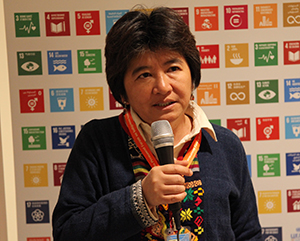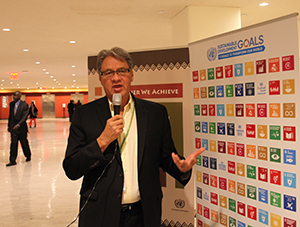Being the result of what has been described as one of the most inclusive processes ever, also embracing the voices of indigenous peoples; many of the 17 universal and transformative Sustainable Development Goals (SDGs) are relevant for indigenous peoples and have direct linkages to the human rights commitments outlined in the UN Declaration on the Rights of Indigenous Peoples.
[caption id="attachment_20718" align="alignleft" width="300"]
 Joan Carling, Philippines, Cordillera Indigenous Peoples[/caption]
Joan Carling, Philippines, Cordillera Indigenous Peoples[/caption]In the new agenda, there are six direct references to indigenous peoples, including in SDG 2 related to agricultural output of indigenous small-scale farmers, and SDG 4 on equal access to education for indigenous children. The global indicators also take into account indigenous peoples’ concerns and aims to track the income of small-scale food producers by indigenous status, indigenous peoples’ access to education compared to other groups, as well as an indicator that reflects secure collective land rights.
During the 15th Session of the UN Permanent Forum on Indigenous Issues, which took place on 9-20 May with a focus on “Indigenous peoples: Conflict, 国产AV and Resolution”, participants shared their views on why the SDGs matter to them and what they hope the goals will achieve for indigenous peoples.
“The Sustainable Development Goals are very important for us to reduce the inequalities that indigenous peoples, including persons with disabilities are facing,” said Pratima Gurung, representing the Nepal Indigenous Disabled Association and the Indigenous People with Disabilities Global Network.
[caption id="attachment_20715" align="alignright" width="300"]
 Grand Chief Ed John, Canada, Tl’azt’en Nation[/caption]
Grand Chief Ed John, Canada, Tl’azt’en Nation[/caption]Grand Chief Ed John, the Hereditary Chief of Tl’azt’en Nation, emphasized that all goals are important. When asked to pick the one that matter the most to him, he chose SDG 3. “From an indigenous perspective, I would certainly take a look at good health and well-being,” he said, explaining how the connection to your lands, languages, cultures and all forms of well-being “balance together from an indigenous perspective”, which can contribute to achieving all of the other goals.
“Education is very important to indigenous peoples,” said Larry Fisher of the Mattakeeset Tribe in Massachusetts. “For us, implementing and finding new strategies and mechanisms to use as education by using our culture, can help to sustain global peace and global conflict resolution,” he said.
Joan Carling, one of the expert members of the Permanent Forum on Indigenous Issues and an indigenous activist from the Philippines, stressed the need to reduce inequalities. “Achieving equality is very important to address the issue of discrimination and marginalization”, she said. She also highlighted the importance “of recognizing the contributions of indigenous peoples in sustainable development”.
Ms. Carling also underlined that all the goals are relevant for indigenous peoples and that indigenous peoples’ participation at local, national and global level, including at the High Level Political Forum, will be key to ensure indigenous peoples rights when implementing the 2030 Agenda. “The participation of indigenous peoples in all these goals, carrying forward their own vision and aspirations, is necessary to ensure that we are not left behind in achieving the Sustainable Development Goals,” she said.
Video credit: UN Department of Public Information

